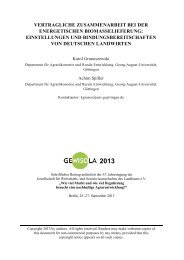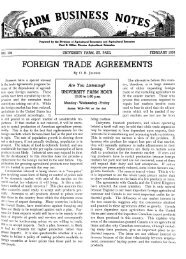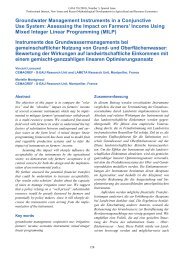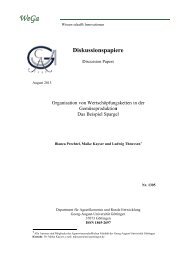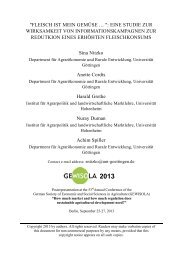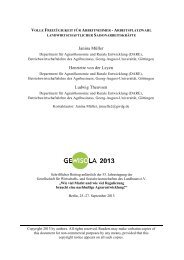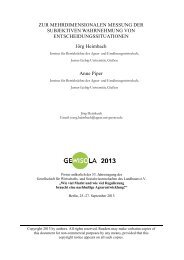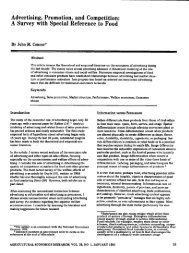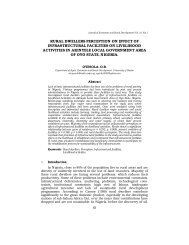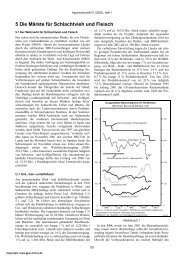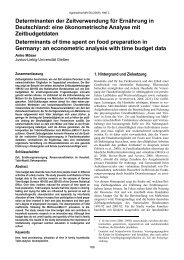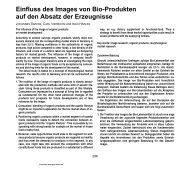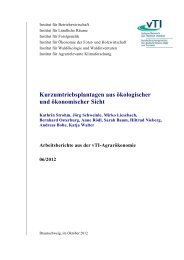District Institutes of Education and Training - Teacher Education
District Institutes of Education and Training - Teacher Education
District Institutes of Education and Training - Teacher Education
Create successful ePaper yourself
Turn your PDF publications into a flip-book with our unique Google optimized e-Paper software.
<strong>District</strong> <strong>Institutes</strong> <strong>of</strong> <strong>Education</strong> <strong>and</strong> <strong>Training</strong>: A Comparative Study in Three Indian States<br />
5.3 The logistics <strong>of</strong> training programmes<br />
5.3.1 Recruitment <strong>of</strong> teachers to programmes<br />
Not all DIETs in the sample had satisfactory arrangements for recruiting teachers<br />
for in-service programmes. This resulted in both duplication <strong>and</strong> absenteeism. For<br />
example, in the seven day SOPT training in Udaipur DIET in July 1999, discussed<br />
below, no training was done on the first day as out <strong>of</strong> 60 teachers who had been<br />
invited, only 12 had arrived <strong>and</strong> as at least 25 were needed, one trainer spent much<br />
<strong>of</strong> that day directly recruiting teachers.<br />
In Masuda, there were similar issues in the recruitment to training. A Sanskrit<br />
teacher in an upper primary school where a training programme was held<br />
observed:<br />
T41 I have attended two training <strong>of</strong> 10 days each.<br />
NP How did you like them?<br />
T41 Madam, I feel the training was…. Now, in my 25 years <strong>of</strong> service, I have<br />
never taught children <strong>of</strong> class I & II, nor do I teach them now but for 2<br />
years, I received the training <strong>of</strong> teaching children <strong>of</strong> class I & II. Now ask<br />
them what was the use <strong>of</strong> that training when I am a Sanskrit teacher.<br />
T4I,T42, T43 We all have to attend.<br />
T41 No distinction, we all have to go (RAJ/MAS 24.4.99).<br />
<strong>Teacher</strong>s in another block also confirmed that they had attended training for year groups<br />
they do not teach (RAJ/NP Sri 5.6.99). The procedures adopted by DIETs (see chapter<br />
6) do not maximise resources; <strong>and</strong> they also lead to disaffection among teachers.<br />
5.3.2 Financial aspects<br />
Part <strong>of</strong> the issue is related to the levels <strong>of</strong> travel <strong>and</strong> daily allowances a teacher<br />
receives. Where this is inadequate, teachers who have further to travel end up paying<br />
out <strong>of</strong> their own pocket, <strong>and</strong> this is a disincentive to attend. For teachers who live<br />
nearby, there is an opportunity to pr<strong>of</strong>it from the allowances by attending again, <strong>and</strong><br />
leaving the programme once attendance has been registered. The knock-on effect <strong>of</strong><br />
such procedures is that training can be associated with making or losing money.<br />
All DIETs commented unfavourably on the parent institute’s untimely<br />
disbursement <strong>of</strong> funds. This <strong>of</strong>ten compromised DIET programmes, which had to<br />
run without paying teachers their travel <strong>and</strong> daily allowances.<br />
5.3.3 Once-<strong>of</strong>f programmes<br />
In addition to their worries about target orientation, some DIET staff also felt that<br />
the dominant programme format also precludes the development <strong>of</strong> an adequate<br />
100 DFID



